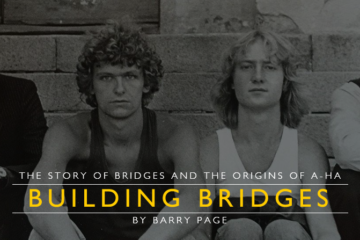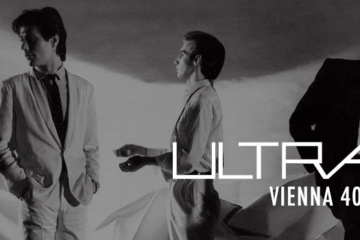As the instantly recognisable voice of a-ha, Morten Harket needs very little introduction. In the second part of our Lifelines series, we take an in-depth look at the solo career of the Kongsberg-born vocalist, uncovering a vast array of projects that stretch back to the late 1980s.
Over the years his versatile and adaptable voice has lent itself to several musical genres, including synth-pop, Christian pop, rock, jazz, folk and even drum ‘n’ bass; while his interest in theology, nature, environmental issues and politics has frequently seeped into his recordings, giving much of the material a spiritual – and often philosophical – slant. With his chiselled, boyish looks and distinctive vocals, Harket was certainly the most marketable member of a-ha – but the transition to a successful solo career, following the band’s hiatus in the 1990s, wasn’t without its challenges…
Headlines and deadlines (1988-1993)
“My potential as a solo performer, commercially speaking, isn’t any smaller than a-ha’s. But at the same time it should be said that a-ha could have been much bigger than we’ve actually been. On the other hand: who’s bigger, Sting or The Police? It depends who you ask.” – Morten Harket
During their commercial peak in the 1980s, a-ha were attracting offers to write theme songs for James Bond movies (‘The Living Daylights’), while Harket himself was in demand not only as a vocalist, but also as an actor; appearing in Kamilla og Tyven (1988) and its sequel the following year (which also featured Harket’s brother Kjetil). He also contributed ‘Kamilla og Sebastian‘ to the Ragnar Bjerkreim-composed soundtrack, a sentimental ballad that encapsulated the friendship between an orphan and a reformed thief. Harket discussed his work on these successful films with Smash Hits magazine: “The person I play is in his twenties and he’s called Christoffer. I enjoyed acting, but I have no aspirations to become an actor… I did it over ten days or so on my holiday and it was good fun. The reason I did the film is because I like the people who are doing it and I like what they’re trying to do – they are trying to fill a gap in the films that are out today for kids because there’s hardly any family orientated films… It has standards. It follows morals that one used to have in that era, because it’s set in the 1940s. I think we have a very cold society and I think the main reason for that is that family life has broken down. I was rebellious in an introverted way when I was a teenager. But I had discipline and respect for my parents and I think the problems that exist with drugs – which is the worst disease to hit our society – and violence amongst young people is because these things have been lost.”
Harket’s strong moral code stemmed from a firm interest in theology that began at school; something which has endured throughout his personal and professional life. It was often lazily reported that Harket had aspirations to be a priest, but his theological studies during his formative years did not last long. “In the end, there were too many other things I wanted to do,” he later recalled. “So I left to work in a psychiatric hospital. Working there was a very good experience. The job taught me how to cope with extremes, stay calm under pressure, and understand people better.” Harket’s primary passion was music and he briefly fronted Souldier Blue (a band that specialised in blues and soul covers) before eventually teaming up with Pål Waaktaar and Magne Furuholmen on his birthday in 1982 to form a-ha. His fame with a-ha eventually afforded him the opportunity to indulge in some of his other interests. One such project was an appearance on ‘Det Er Ennå Tid’, an uplifting track that was used to promote a 1989 Scout convention in Skaugum. The promotional single was credited to Bjørn Eidsvåg with Morten Harket and the Oslo Gospel Choir. Eidsvåg was a well known Norwegian songwriter, musician and Spellemannprisen award winner, who shared Harket’s interest in theology. Known affectionately as ‘Rockepresten’ (Rock priest), the ordained minister later conducted the ceremony at Magne Furuholmen’s wedding in August 1992.
During this busy period in the late 1980s, Harket also contributed backing vocals to ‘Merciful Waters’, an atmospheric – though unremarkable – single released by Jan Bang in 1989. The song also featured on Bang’s Frozen Feelings album (“It wasn’t a very good record,” Bang told All About Jazz in 2010). It was often claimed that Harket also sang on the album’s title track (which also closed the cult Icelandic movie Foxtrot), but this was never substantiated. Years later, Bang, an accomplished Norwegian musician and producer, worked on projects involving the likes of David Sylvian and Brian Eno, and also co-founded the annual Punkt music festival, which Magne Furuholmen performed at in 2007.
Ventures like this, in addition to his flirtations with the celluloid medium, allowed Harket to break away from the singer’s often perceived ‘poster boy’ image. Indeed, by the time of the band’s fourth album East Of The Sun, West Of The Moon, Harket had grown his hair long; while the trio were now recording Everly Brothers songs (‘Crying In The Rain’) and chasing a more organic and guitar-based sound. Waaktaar certainly hadn’t been impressed with the previous album Stay On These Roads, as he later recalled: “I remember we were at a dinner with George Harrison and Robbie Robertson. They advised us to always follow our gut feelings – all or nothing. And we sat there having just done a limp album with [Alan] Tarney, and we thought, “fuck”. I blame it a little on the Norwegian thing – you’re supposed to gratefully accept whatever they give you and try to make the best of it. You don’t have that English “fuck this” attitude. We got tougher as we got older, but then it began to be a little late.”
With a cash register still continuing to swell, following a series of hit singles and albums, the record label were understandably disappointed with a-ha’s ostensibly uncommercial change of sound on their fourth long player. Harket, meanwhile, was similarly disenchanted with the new direction; later describing the album as “the first recording that really suffered from the band’s inferiority complexes – the after-effect of having been smeared with teenage hair gel over time. We were supposed to make a big effort to sing cooler, bring out other sides. But I can’t work that way – I sing naturally the song that’s presented to me. What happens, happens. It was Paul and Magne’s trip. I felt instinctively that it was wrong, but tried to go along [with it].” Whilst the band weren’t quite the same commercial proposition they were in the 1980s, the new decade would see them consolidate their force as a live act, particularly in South American territories. The new year (1991) was particularly busy for the band; playing several dates in support of their fourth album, as well as recording a brand new track (‘Move To Memphis’) for the Headlines And Deadlines hits album. Harket also found the time to feature on Silje Nergaard’s Silje album, duetting on ‘Where You Are’ with the popular jazz vocalist.
Studio tensions within the band came to the fore once more as they recorded their fifth album Memorial Beach at Prince’s Paisley Park studio, with Furuholmen detailing some of his frustrations (that had also been echoed by Harket) in ‘Lamb To The Slaughter’. Waaktaar had contributed 85% of the album’s songs, with the material showcasing a grander, more guitar-based sound, and the clearest showing of their musical influences – both old and new – to date. The band’s love of The Doors was clearly evident on cuts such as ‘Cold As Stone’ and ‘Lamb To The Slaughter’, while elsewhere there was Prince-like funk on tracks such as ‘Lie Down In Darkness’, and more-than-faint rumblings of Joshua Tree-era U2 on ‘Dark Is The Night For All’. The increasing popularity of the CD format offered the band the opportunity to extend the length of several songs, with the stadium rock of ‘Cold As Stone’ stretching to over eight minutes (something of a throwback to the band’s roots in Bridges, the pre-a-ha band that Waaktaar had briefly considered reforming at the start of the decade). “It’s strong material,” admitted Harket years later. “But there’s an inferiority there. We’re an ostrich waiting to fly… The song material is good enough, but we’re trying to shove it in a certain direction. It quite simply isn’t honest…The producer, David Z, was really very good and did some great things. But Paul stopped those resolutely. He killed David Z’s spark. The tensions in the power balance between Paul and Magne were also at their strongest.”
The band were beginning to implode, but Harket was able to distract himself with some new projects. These included a faithful version of the much-covered Frankie Valli hit ‘Can’t Take My Eyes Off You’ for the Coneheads movie soundtrack. More crucially, Harket was about to become the first member of the band to release a solo album…
Poetenes Evangelium (1993 Album)
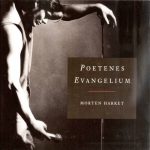
“Things will come from me, which will be hard to swallow for some. I am sick and tired of people wanting me to fit into ‘one’ role. I do what I think feels right.” – Morten Harket
Once the German leg of the Memorial Beach tour had ended in September 1993, Harket was able to take advantage of a break in the touring schedule and switch his attention to Poetenes Evangelium, a collection of 20th Century poetry set to music composed by Øivind Varkøy; all depicting the life and death of Jesus. Harket was certainly ready for a change of direction, as he told Treff magazine that year: “I have always had control of things, but lately I have found this to be more and more of a hindrance. Now I feel the strong need to get rid of the control. I want to get away from any predictable and well-known situation…I have been walking for too long on well-trodden paths.”
The ambitious project was masterminded by Erik Hillestad, a well known musician and producer (particularly amongst the church community), and the album was released through his Kirkelig Kulturverksted label at the end of the year. The album was based on Poetenes Evangelium: Jesu Liv I Norske Dikt, a 191-page anthology that Harket’s future collaborator Håvard Rem had released in 1991 (roughly translated as ‘The Gospel of the Poets: Jesus’ Life In Norwegian Poetry’). “I had no idea what would happen when I sat down in front of the microphone to sing these songs,” Harket recalled that year. “I didn’t know anything. I didn’t know anything about how I should sing. I didn’t even know the melodies – they were just as unknown to me as the lyrics. When I heard the piano chords, I didn’t think that they fitted together with the lyrics.”
The studio band included keyboardist Kjetil Bjerkestrand, guitarist Frode Alnæs and Per Hillestad, a drummer that Harket was already well acquainted with (both in a-ha’s live set-up and on their previous two albums). Bjerkestrand would later play a big part in the a-ha story, teaming up with both Harket and Magne Furuholmen on future projects. More recently, in 2016, Hillestad, Bjerkestrand and Øivind Varkøy collaborated on Poetisk Tale, which featured jazz singer Solveig Slettahjell’s interpretations of various Norwegian writers’ works (including Gunvor Hofmo, who was a huge influence on Pål Waaktaar during the Bridges period).
“The lyrics on Poetenes Evangelium aren’t necessarily very evangelical,” Harket explained. “The lyrics are what I would call ‘testimonies’; the authors describing what they’ve experienced themselves. Several of the poems are so ‘spaced out’ that you can’t figure them out with your head – you have to be hypnotized into it. I have sung many of those lines without knowing what I am singing about. But if you have an open and intuitive mind, they will make their way in… They are written with a kind of curiosity and openness that I can relate to.”
Whilst Harket found the recording process challenging, similar challenges were to be found for the album’s listeners; particularly a-ha fans who weren’t used to the vocalist singing in his native language. “I have never worked on anything that has been more uncertain and abstract than this,” Harket confirmed. As far removed from a-ha’s synth-pop as you could possibly expect, it’s an unconventional collection of songs that takes its listeners on a journey from Jesus’ life to death; familiar stories that are simply and eloquently interpreted, without ever being preachy. What really shines through, however, is the quality of Harket’s versatile voice; allowing the material to smoothly transcend the language barrier. Vårt Land, a popular Christian newspaper, certainly agreed: “Even if the album isn’t perfect, Harket’s voice acts as a gateway to the words, and is much more than just an intriguing celebrity gimmick.” The newspaper Haugesunds Avis offered a somewhat contrasting review, however: “Harket sings in a way too contrived and fumbling manner, on top of non-melodies so pretentiously serious that it borders on parody.” Whilst it’s certainly a challenging album (and not exactly brimming with immediate, catchy songs), it’s nevertheless a beautifully produced album that can be enjoyed both as a late night ‘chill-out’ album, or indeed as a Sunday morning soother. The use of strings, particularly on tracks such as ‘Sviket’ and the opening ‘Natten’, give some of the interpretations a haunting, ethereal quality. And while the arrangements are often sparse, there’s enough musical adventure to sustain the listener’s interest. ‘Salome’ adds contemporary beats and programming to the mix, and there are some beautiful choral flourishes on ‘Rytteren’.
Harket was keen to point out that he didn’t regard Poetenes Evangelium as a solo album: “Far from it,” he stated. “The album wasn’t planned. This whole album is a gift, not just to us, but to those who get their hands on it.” Whilst it wasn’t a big seller, the album was duly promoted via a series of radio and TV interviews; while two promotional videos (for ‘Natten’ and ‘Salome’) were filmed during a trip to Israel in October that year, and shown (as trailers) in cinemas throughout Norway. It was a trip that seemingly had a profound effect on Harket: “I met 17-year old girls and boys with guns in their hip pocket,” he recalled. “They would show their love for each other, but knew at the same time that a bomb could go off anytime. I experienced that same intensity in Rio – life was decaying and blossoming at the same time.” Having originally met in 1992, Harket reconnected with Håvard Rem during the trip, forming a bond that would eventually lead to a songwriting partnership. “He appeared at the right time and was the fire I needed,” Harket later told Norway’s largest newspaper Aftenposten. “I knew I needed someone to sharpen me, because I knew I had come to some point… and I knew I had powers in me that only Håvard could get out.”
Wild Seed (1995 Album)
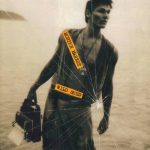
“He could have been both Cliff Richard and Bob Dylan, but he’s neither and expresses himself as a kind of mixture.” – Håvard Rem
In between Harket’s promotional duties for the Poetenes Evangelium album, a-ha resumed the Memorial Beach tour in mid-December (1993). The band also found time to release a brand new single, ‘Shapes That Go Together’, for the Winter Paralympics in Lillehammer. A minor UK hit in March 1994, this represented the last of the band’s material to be released in the 20th century. Also released that month was Millimeter, a Spellemannprisen-award winning album by Norwegian rock singer Anne Grete Preus, featuring Harket performing backing vocals on the funky title cut. At the other end of the musical spectrum, Harket contributed a track to a Kjetil Bjerkestrand-produced collection of Norwegian evening prayers titled Nå Lukker Seg Mitt Øye. Set to a beautiful piano accompaniment, Harket contributed a plaintive version of ‘Me Slår Framfor Oss Krossen Din’ to the cassette release (it was eventually re-released on CD format in 2001).
By this stage Harket was now totally committed to a solo career, and had already started working with Håvard Rem on new material during a break in the Maldives at the turn of the year. “After we’d been to Jerusalem, I sent a few texts to Morten in England,” Håvard Rem told Aftenposten. “On the plane home, I wrote my first poem in English. Two weeks later, the melody to it was on my answering machine.”
Whilst a-ha did not officially split up, the first phase of their career came to a natural end, following the conclusion of their tour in June 1994. “There were no new disagreements – they were the same ones we always had,” Harket explained to musicOMH magazine in 2006. “When we stopped we were fed up with the media – I certainly was. I was fed up with the media’s take on what a-ha was… We were just fed up because the take on a-ha was that we belonged to 1985 and we had never embraced that – we just accepted it for a while. So we pulled the plug and let everything go [down] the drain.” The finality felt by Harket was seemingly unbeknownst to Paul Waaktaar-Savoy, who continued to work on new a-ha songs, before eventually conceding defeat and forming a new band (Savoy) with his wife, Lauren, and Frode Unneland. Waaktaar’s frustrations, vented in the Savoy song ‘Daylight’s Wasting’, were seemingly shrugged off by Harket: “If Paul writes lyrics about a problem he’s having or something he needs to put into words, in his own way – even if it is a stab in the back to me – that’s okay with me,” he later told Puls magazine. “I don’t have any problems with that. I’m sitting there, not sure of whether he really needed it or not, but that isn’t particularly interesting.”
Whilst Harket had co-written a handful of a-ha’s songs (notably ‘Take On Me’, ‘Stay On These Roads’, ‘Touchy’ and ‘Living A Boy’s Adventure Tale’), he was more renowned for his vocal skills than his songwriting abilities. This was a challenge that the singer was faced with during his initial collaborations with Håvard Rem. “I am actively a songwriter now,” he told VH-1’s Paul King in 1995. “I started to write at the beginning of last year, and at that point I had no experience with any of that process, so I’ve learnt quickly as I’ve gone along. And I’ve changed my methods on how to do it as I’ve gone along…I started looking for songs and very quickly I started to write instead. And then I started recording in the way that I’m used to recording with a-ha, but I kind of felt my way through it and put pieces together bit by bit.”
Aiding Harket during the recording sessions (in Norway and the UK) was producer Christopher Neil. Neil was well known to Harket, having produced both the East Of The Sun, West Of The Moon album (with Ian Stanley) and the ‘Shapes That Go Together’ single. “It was my luck that he had the time to do it, because he has been very successful and everyone wants to work with him,” Harket told Radio Signal One in July 1995. “I invited him to Norway. I wanted to let him come over to listen to some of the songs I had been working on and that I myself had written. He loved the idea. He came and the material was completely different from what he had expected. And so he was even more enthusiastic – and keen to produce the album with me. There were no obstacles. He was totally excited about the whole process. One song after another surprised him.”
The recording of Wild Seed would take several months. The musicians included Kjetil Bjerkestrand (the keyboardist who had played on Poetenes Evangelium), bassist Øyvind Madsen and Per Lindvall (the future a-ha drummer who had played on some of ABBA’s recordings in the early 1980s).
According to Harket, the record label had to be convinced about his change of direction: “At first, I recorded the album Warners wanted to have. It’s there, finished and all,” he told Aftenposten. “But I myself didn’t want to have this one. So I had to give them something else. Little by little, I gave them my own thing, songs I’d written myself… It was necessary for me that the record company threw away the old in favour of the new; that they changed their minds in my favour. Not because I argued for something they didn’t want, but because my music convinced them.”
The year 1995 would prove to be extremely busy for Harket. Aside from finishing Wild Seed, there was also time for a guest appearance on an album by Kamilla Og Tyven composer Ragnar Bjerkreim, titled Missa Caritatis; with proceeds from the February release going towards the Norwegian Missionary Society. Harket contributed vocals to ‘Hymne Til Kjærleiken’ (which also featured soprano vocalist Bodil Arnesen) and ‘Sanctus’, a largely choral piece. The following month, Harket and Håvard Rem were interviewed in the Maldives as part of a documentary about the making of Wild Seed.
The summer of 1995 was spent debuting new material, which included an interpretation of Sam Cooke’s 1964 Civil Rights Movement anthem, ‘A Change Is Gonna Come’ (the song was performed during a surprise appearance at a peace celebration concert in Oslo in June). Harket also previewed some other new songs – in unplugged versions – during some radio promotion in the UK in July, including ‘I Don’t Have The Nerve To Leave You’ (which currently remains unreleased), ‘Half In Love Half In Hate’ and ‘A Kind Of Christmas Card’, which was scheduled as the album’s first single.
Other collaborators on Wild Seed included a friend of Håvard Rem’s, named Ole Sverre Olsen; described by Harket as “a really interesting character”. Olsen faxed the words to ‘Half In Love Half In Hate’ to Harket on New Year’s Eve, and the recipient was sufficiently enthused by his efforts to build a song around the fax (Olsen would later contribute lyrics to future Harket songs, both within and outside of a-ha). Elsewhere, the Norwegian poet, Henning Kramer Dahl (who sadly died earlier this year), co-wrote ‘East Timor’, while ‘Spanish Steps’ was sourced from a 1992 album (Tour De Force) by the trumpeter, Ole Edvard Antonsen. Originally titled ‘5000 Miles’ and credited to Torstein Flakne (from the Norwegian rock band, Stage Dolls), new lyrics were added to the track which was eventually released as the album’s second single.
The first public airing of Harket’s new solo venture had already arrived in June 1994, via an exclusive contribution towards MTV’s ‘Vote Europe Weekend’. “I read this poem by Joseph Brodsky, a Russian writer and poet, called ‘Bosnia Tune’ or ‘Time Will Pronounce’,” explained Harket. “It’s called ‘Bosnia Tune’ but I don’t really see it as about Bosnia, it’s more about the west… I just ended up doing this piece to it. It’s not really a call for action or anything, it’s just a comment really.” The title ‘Time Will Pronounce’ had already filtered into popular culture, via Michael Nyman’s 1993 album of the same name, while Joseph Brodsky himself was a huge literary influence, and a winner of the Nobel Prize in Literature in 1987. Harket was clearly impressed by Brodsky’s ‘Bosnia Tune’ (published in 1992), relaying the abstract piece word-for-word via his own effective 3-chord strum. It was eventually retitled ‘Brodsky Tune’, one of the highlights of the Wild Seed album.
“Some of the songs are light, some not so light,” Harket told VH-1, when asked about the album. “But they’re all pretty direct I think – more cutting than things I’ve done before.” Aside from ‘Brodsky Tune’ there was also ‘East Timor’, which begins with the lines “Sandalwood trees are evergreen/ Cut them down/ Plant coffee beans/ Build no schools/ Construct no roads”. The track dealt with a subject that was close to Harket’s heart: East Timor’s fight for independence. Harket was able to use his high profile to highlight the plight of the Timorese people, and was involved in a Max Stahl-directed documentary titled Sometimes I Must Speak Out Strongly. Two activists, Bishop Carlos Belo and Jose Ramos-Horta, were later named joint winners of the 1996 Nobel Peace Prize, and Harket duly performed ‘East Timor’ at the subsequent concert.
‘Ready To Go Home’ was a near-identical cover of a 10cc song that had featured on their final 1995 album Mirror Mirror, and later re-recorded in a more electronic version on Gouldman’s 2000 solo album And Another Thing. The track was credited to Graham Gouldman and singer-songwriter Andrew Gold (who had both recorded a handful of albums as the duo Wax in the 1980s, including the excellent American English, which had been co-produced by Christopher Neil). The lyrics were inspired by the death of Gouldman’s father in 1991: “I suppose I was trying to put a positive slant on his passing,” the 10cc guitarist later revealed. “Remembering all the things we had done together and his artistic legacy to me. The last verse of the song best reflects my feelings on this.”
The first single from the album, ‘A Kind Of Christmas Card’, was released in August, and included a live version of ‘A Change Is Gonna Come’ (in Germany the single was retitled ‘Burning Out Again’, presumably to distinguish it from more traditional Christmas songs). The origins of the track can be traced back to 1994 and a chance encounter in Trondheim with a Norwegian band named Locomotives, who had been active since 1991. Harket picked up the story several years later: “Well, I was on the way home. It was late. I was at a relatively early stage when it came to preparing my first solo record. I was also in the process of searching as a songwriter. So that’s when I met them…I invited them into the studio where they played the song [‘My Woman’] that was to become ‘Movies’. At once, I thought that it was my song – I want a song like that! Then I drove right home and composed ‘A Kind Of Christmas Card’ as an answer of sorts.” The lyrics to the song stemmed from a visit to Los Angeles, and a meeting with a friend who relayed the story of a Norwegian girl who had journeyed from Norway to L.A. to become a film star. “That was her dream,” Harket explained to VH-1. “And then very quickly [she] started doing X rated movies, porn films (which has become a very big industry there), and got deeply involved with drugs. When my friend realised what was happening to her, she contacted the Norwegian consulate and got her put on a plane back to Norway – hopefully in time. This prompted Håvard to write the lyrics for ‘Christmas Card’.” VG were certainly impressed with the single: “Morten Harket may be about to make an ingenious turn in his career, because on ‘A Kind Of Christmas Card’ he appears with a brand new style. And it sounds very promising. A new haircut, a new voice and a new sound are important keywords. Harket’s voice has become noticeably lower and more raspy; like a cross between a young and potent Rod Stewart and a focused Feargal Sharkey.”
Wild Seed’s front cover, which displayed an ocean-traversing Harket carrying a typewriter, certainly symbolised his rebirth as a songwriter. And, as a document of where he was at that stage in his career, both in terms of the development of his songwriting and the musical direction in which he was heading, Wild Seed certainly does the job. In interviews, Harket name-dropped artists such as Crowded House and Sting, and you can certainly feel their influence as the album occasionally lapses into safe, MOR territory. Indeed, the newspaper Haugesunds Avis commented that: “The music lacks soul… There is something a little too safe and complacent about Wild Seed.” In the UK, the (now-defunct) Today newspaper remarked that: “he sounds like Sting on a bad day, on this gloomy and pretentious effort.” But, on the whole, Wild Seed was largely lauded by the music media, particularly in Norway. Vårt Land declared it an “impressive solo effort”, while VG praised the album for its songs and vocals: “Wild Seed is first and foremost a triumph for Morten Harket as a songwriter and vocalist. He’s using a wider vocal range than before, and that’s to his benefit.”
There are indeed some wonderful moments on the album. ‘Brodsky Tune’ is simplicity itself, with Harket delivering an almost David Sylvian-like vocal to convey Brodsky’s wordy meditations on Bosnia. Elsewhere, ‘Los Angeles’ and the chilling, funereal ‘Lay Me Down Tonight’ harked back to the melancholia of a-ha, ‘East Timor’ has a charming, whimsical – almost psychedelic – quality to it, while ‘Spanish Steps’ drifts along in a pleasing ‘Streets Of Philadelphia’ kind of way. What the album lacked were the big soaring choruses and pop hooks that Messrs Furuholmen and Waaktaar were able to provide; and there are some tracks which are best described as fillers – notably the lyrically slight ‘Tell Me What You See’ and ‘Lord’, a dull ‘Dear God’-type monologue.
As for Harket’s claim that there was another version of the album that “Warners wanted to have”, this is backed up by some of the outtakes that have appeared online, including ‘Sounds Of Rain’ and ‘A Place I Know’, which are certainly more pop-oriented. One particular track, the slightly more abstract ‘Gospel From A Heathen’, was cut from the album at the record label’s insistence. Despite Harket’s assertions that it was “a song about love”, lines such as “I’m not an atheist/ But I’ll be an atheist for you” and “Well, I’m not a fascist/ But I’ll be a fascist for you” were deemed to be too controversial.
Regarding the chart performances of Harket’s new material, there were some contrasting fortunes in the Norway and the UK. Both the single and album hit number one in Harket’s homeland, and Wild Seed went on to become the year’s biggest-selling album, eventually selling over 180,000 copies. In the UK, the single and album fared less well; reaching a disappointing number 53 and 89, respectively. In fairness, a-ha were already past their commercial peak in the UK, and several of their more recent singles (‘I Call Your Name’, ‘Early Morning’ and ‘Angel In The Snow’) had all failed to reach the Top 40 and, arguably, Harket’s profile had tapered off in recent years. Despite doing plenty of TV and radio promotion, the release of Harket’s debut solo single at the height of Britpop had been mistimed, with the attentions of the British record-buying public swaying more towards Oasis and Blur’s battle for the number one spot that month.
Whilst success in the UK would allude him, Harket was kept busy in his homeland until the end of the year. Aside from the release of the ‘Spanish Steps’ single (featuring the non-album track ‘Girl’ on the b-side), there was a new compilation album released, titled Kom Ut Og Lek! Recorded in co-operation with the LO (Norway’s largest employee association), the album featured several greats of Norwegian music, including Lars Lillo-Stenberg (of deLillos) and Magnus Grønneberg (CC Cowboys). Harket’s contribution was ‘Evig Ung’, a Norwegian-language version of Bob Dylan’s ‘Forever Young’.
The year was rounded off with a Norwegian tour that included performances of several new and unreleased songs. Whilst the new year would provide Harket with some fresh challenges, his interview with VH-1 in the summer of 1995 seemed to sum up his feelings of contentment as a solo performer: “I’ve never had it better than I have now,” he said. “These are by far the best two years I’ve had without a doubt.”
Vogts Villa (1996 Album)
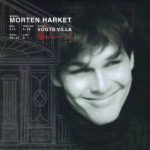
The critical and commercial success of Wild Seed was acknowledged during the Spellemannprisen award ceremony in February 1996, with Harket winning awards in both the best song (‘A Kind Of Christmas Card’) and album categories, as well as ‘Best Male Artist’ and ‘Spellemann Of The Year’. In a move that was surely designed to capitalise on these successes, Warners released ‘Los Angeles’ as a single, but the lack of any new bonus tracks hardly made it an attractive purchase. ‘Spanish Steps’ was released as the UK’s second single, but a lack of promotion ensured it wouldn’t chart. Indeed, a perceptive Harket had already moved on to other projects. “I could see dangerous signals about dissolution within Warner Music internationally,” he told VG. “I understood that the album was going to be lost, so I withdrew [from more promotion]. I didn’t want to go down that route, even though I had just been to Mexico, received a great response and been upgraded to Warner’s main priority in Latin America.” There were problems in the Savoy camp, too, as a change of personnel at Warners eventually led to their switch to the EMI label.
During the Wild Seed tour, Harket had performed a number of new songs, including ‘All Of You Concerned’, ‘Heaven’s Not For Saints (Let It Go)’ and ‘Ape Angel’ (a more rock-based composition). In March, Harket performed two further new songs (‘Queen Of Stormy Weather’ and ‘End Of The Western World’) at a show at the Rockefeller Centre in Oslo; songs that had, ostensibly, been penned during a working trip to South America (the filming of an arts programme called Safari for Norwegian TV). All the signs were pointing towards a quick-fire follow-up to Wild Seed, and this appeared to be backed up by the release in May of a brand new single on the Arista label, the Steve Lovell-produced ‘Heaven’s Not For Saints (Let It Go)’. In a smart marketing move, the track (co-written by Håvard Rem and Ole Sverre Olsen) was performed at the Eurovision Song Contest in Oslo, which was also presented by Harket (along with journalist Ingvild Bryn). Boasting his most epic production to date, and a suitably soaring chorus (“The night is calling you/ Close to the edge/ Who knows the distance/ The distance when light fades away”), the single was another top ten hit in Norway, but failed to chart in the UK.
The summer was spent performing several indoor and outdoor shows in Norway, as well as working on new material with Ole Sverre Olsen. One particular concert during the Skagerrak Kulturfestival in August featured an unusual ‘pop and poetry’ set from Harket that included English-language songs, interspersed with poetry readings from both Håvard Rem and Ole Sverre Olsen. August also saw the release of Songs From The Pocket, the debut album by Jørun Bøgeberg, a bassist who had previously played on the Millimeter album by Anne Grete Preus (which had featured Harket on the title track). Prior to that he had played on both East Of The Sun, West Of The Moon and Memorial Beach, and would feature on future releases by both a-ha and Savoy. The album, which was housed in a Magne Furuholmen-designed sleeve, also featured Per Hillestad on drums. Harket’s vocals can be heard on the mournful and elegiac ‘Never Hear That Laugh’ (“I’m sure all the angels were singing in the sky/ Wishing you welcome as we said goodbye”).
Whilst Harket had stockpiled a number of new songs, there was a change of direction for his next release. By September, Harket was committed to recording a new Norwegian-language album for the Norsk Plateproduksjon label, featuring lyrics by both Håvard Rem and Ole Sverre Olsen. Provisionally titled Gammel Gris (‘Old Pig’), the album was recording during a productive 12-day period on the remote Norwegian island of Dvergsøya. Vogts Villa, an old country house – and future holiday home for the Crown Prince of Norway – had been converted into a recording studio, and Harket had assembled a new band that included multi-instrumentalist Geir Sundstøl (who would later play on sessions by both a-ha and Savoy), plus Thomas Tofte and Kåre Vestrheim from the band Locomotives, whom Harket had met in 1994. Lyrically, the material drew heavily from the poetry of Håvard Rem (who published Taksameteret Går, an anthology of his work, in 1996). For ‘Fremmed Her’ and ‘Jeg Kjenner Ingen Fremtid’, Harket recycled the previously unreleased songs, ‘Gospel From A Heathen’ and ‘All Of You Concerned’ (though the latter would eventually make it on to the b-side of 2008’s ‘Darkspace (You’re With Me)’ single). Elsewhere, ‘Vuggevise’ was a new Norwegian-language – and country-tinged – version of ‘Lay Me Down Tonight’ (from Wild Seed).
Harket previewed some of the new songs during a concert at Bredtveit Prison in October. To the outsider this would have seemed like an unusual move but, in addition to the likes of Simon & Garfunkel and Queen, Harket had grown up listening to Johnny Cash, who had famously played at San Quentin and Folsom Prison, so the chance to play a handful songs at a women’s prison would no doubt have appealed greatly to the 37-year old singer.
‘Tilbake Til Livet’ and ‘Herre I Drømmen’ were released as promotional singles, with the album Vogts Villa hitting the shops at the end of November.
Without a big hit single to bolster its sales, the album peaked at a disappointing number 21. Reviews were certainly mixed. Vårt Land declared the album: “A good follow-up from one of our very best artists. It’s clear that Morten and his buddies have enjoyed their cabin trip. Vogts Villa displays a musical playfulness and relaxed atmosphere that our former superstar probably needed to travel a far distance outside the regular studio walls to find.” Haugesunds Avis, meanwhile, were equally enthused: “Wild Seed was the most overrated Norwegian album last year. I much prefer Vogts Villa – it’s more introverted, melancholic, stripped-down and honest. Choosing to work with young and energetic musicians – led by the brilliant Geir Sundstøl – has been a smart move.” However, one of Norway’s tabloids, Dagbladet, criticised the album for its lack of ambition. In 1997 the same newspaper sensationally declared Harket “a fallen star with an audience reduced to a tenth”. The paper had, somewhat unfairly, compared the 180,000-selling Wild Seed to Vogts Villa’s somewhat more modest sales of 18,000, even going to the lengths of asking the record label’s Per Østmark to comment on the album’s poor performance. “There was never the intention that this would be a great deal like Wild Seed,” Østmark told the popular newspaper. “But we hoped it would sell a little more, of course.” Østmark also admitted that they would have considered advertising the album on TV during the lucrative festive period if initial sales had been better.
Whilst in some quarters, the Vogts Villa album was viewed as a suicidal career move in light of the success of Wild Seed, it would be foolhardy to dismiss the project as merely a vanity project from a musician who was harbouring major label disenchantment. Instead, it’s easier to view the album more as a stop-gap release, with Harket still honing his songwriting skills. And, besides, there’s plenty to enjoy on Vogts Villa, with Harket’s latest studio band utilising a number of instruments (mandolin, harmonica, mellotron, pedal steel guitar, etc) to great effect. Like the similarly-styled Poetenes Evangelium, its appeal wasn’t immediately apparent, but there are a number of standout tracks. ‘Tilbake Til Livet’ and ‘Herre I Drømmen’ boast decent hooks, ‘Jeg Kjenner Ingen Fremtid’ features a typically haunting vocal that recalled Chris Isaak in his pomp, while ‘Gammal Og Vis’ saw Harket employing a more playful, folky style.
By the end of February 1997, Harket had concluded his Norwegian tour in support of the album and his focus would soon switch to the writing of a new album for the international market. But the reformation of a-ha in 1998 would mean the English-language follow-up to Wild Seed wouldn’t be released for at least ten years…
Sidelines and Lifelines (1997-2006)
“He can go from having the world’s worst taste to having the world’s best taste. He’s open to everything; to a degree that, in the end, works against him, because he ends up not having any point of view. I think this has been destructive for his solo career. When you do everything from house music to romantic ballads, people think: where are you coming from? What are you thinking?” – Paul Waaktaar-Savoy
In between working trips to China and Jamaica with his regular writing partner Håvard Rem, Harket also found the time to perform some (largely low-key) shows throughout the year, and also appeared on a compilation album titled Kvirre Virre Vitt! that was released in May. Featuring childhood favourites by both new and established Norwegian artists, the album included Harket’s contemporary version of the popular children’s folk song ‘Kråkevisa’ (aka ‘The Crow Song’), while other notable artists included future a-ha collaborator Anneli Drecker. Also released in 1997 was First Breath, the debut album by Harket’s then-wife Camilla (with whom he had three children), but the couple would announce their divorce the following year, after nine years of marriage.
Aside from the change in his personal life, there was to be a significant change in Harket’s professional career, too, with the announcement that a-ha were to reform for the Nobel Peace Prize Concert in December 1998. The reformed band, backed by studio stalwarts Per Lindvall and Kjetil Bjerkestrand, performed ‘The Sun Always Shines On TV’ and a brand new song, ‘Summer Moved On’. “We were in reality way too busy with our own projects,” Harket told VG in 2007. “There was nothing to indicate that we would reform. We were tricked back together in a peculiar way. The response from the audience was totally unexpected – it had such a warmth, a feeling of them reaching out to us, like an attempt to make contact.”
Whilst the plans for a new solo album had to be put on the back-burner, Harket kept busy during this period. The summer of 1998 saw the release of the soundtrack to the musical of Sophie’s World, which received its world premiere in Germany in June 1998. Harket contributed ‘A Jester In Our Town’ (in the role of Socrates). Further displaying his versatility, the quirky theatrical track was later released as a promotional single. The 1991 Jostein Gaarder book on which it was based also received a movie adaptation in 1999.
Within the same soundtrack medium, Harket also contributed the mid-paced ‘Jungle Of Beliefs’ to the Swedish TV series Cultures Span The World. The project saw Harket reunited with Ragnar Bjerkreim, who had masterminded the Missa Caritatis project. Aside from its appearance on the accompanying soundtrack album, the track (which featured lyrics by both Harket and Ole Sverre Olsen), was also released as a single in 1999, and was a minor hit (the CD included a bonus instrumental version of the song, titled ‘Boys On Timber’).
There was one rather unusual collaboration, with Harket undergoing a rare foray into the world of dance music. Harket worked on three tracks with Swedish drum’n’bass duo Boolaboss, with ‘The Secret’ scheduled for release as a single in 1999. The single was abandoned as a-ha became Harket’s primary focus; the trio eventually cementing their reunion with the recording of their sixth studio album Minor Earth Major Sky. However, before the new project could be green-lighted, Harket insisted on an equal share of the band’s income as they entered the second phase of their career. “You cannot ignore the money side of things when you’re living in a universe with this kind of earnings potential,” he explained to Jan Omdahl. “I’m unquestionably the one who has earned the least, because of the way things have been set up. I had very clear criteria for going along a second time around, and to be honest, I had very little faith that my conditions for that would be met. But they were, in fact. Now we are – for the first time – starting to approach a division of income in which the contribution of each of us is considered equally valuable. We’re coming together like the three stubborn billy goats that we are, and whatever comes out of it, we all get a piece.”
In terms of songwriting, a new era was marked with each of the three members of a-ha all contributing material. For the first time since the band’s inception, Harket – who’d grown increasingly confident as a songwriter – was making a more creative contribution (parallels could certainly later be made with Depeche Mode, whose singer Dave Gahan had started to contribute material with his own songwriting team from Playing The Angel onwards). For Minor Earth Major Sky, Harket drew from his well of songs with regular writing partners Håvard Rem and Ole Sverre Olsen, contributing ‘To Let You Win’ and ‘Thought That It Was You’. ‘To Let You Win’ had previously been performed as a solo song, and Paul Waaktaar-Savoy later declared it as one of his favourite Harket-penned songs.
Minor Earth Major Sky was a hit with both critics and fans, and its success was consolidated with a number of live dates throughout 2000 and 2001. But the new found democracy within the band was stretched to the limit as its three members battled to get their material on to their 2002 album Lifelines, a body of work that eventually sprawled to 15 tracks. “Magne went too far pushing for songs,” complained Harket. “It became his private project. He was going to have his own way and, in the end, didn’t give a fuck about me… We wound up with an album with too many of both Paul’s and Magne’s songs – the songs that should have been trimmed away were by those two.” Harket’s own co-writes produced mixed results, as he admitted: “‘Forever Not Yours’ is one of those songs that sums us up – melancholic, and at the same time uplifting, soaring…’Turn The Lights Down’ ended up as a soppy ballad. It could have been a killer – Magne wrote a very important part, but it ended up being something it absolutely shouldn’t have been. To my mind that song was totally mismanaged, and Paul thinks so too… The same thing with ‘Oranges On Appletrees’ – it should have been produced under the influence of magic mushrooms!”
There were similar tensions evident during the recording of 2005’s Analogue album, but the songs benefitted from a more focused approach, as the band dispensed with the large number of producers that had blighted the previous album. Harket’s contributions included ‘Holy Ground’, a composition that dated back to the late 1990s.
Whilst the wheels of the a-ha machine were in full motion during the first half of the decade, Harket still found the time to collaborate with a number of other artists. In December 2000, EMI released a Salvation Army charity album in Norway titled Perleporten. Produced by jobbing guitarist Jørn Christensen, Harket and Spellemannprisen award winner Anne Marie Almedal (from the Norwegian band Velvet Belly) duetted on ‘Han Er Min Sang Og Min Glede’, a gorgeous stripped down version of a country standard (previously covered by artists such as Elvis Presley and ABBA’s Anni-Frid Lyngstad). In November 2001 the Norwegian boys choir Sølvguttene released Synger Julen Inn, which included Harket’s version of ‘Mitt Hjerte Alltid Vanker’, an old Scandinavian Christmas song that dated back to the 18th century (Harket had previously performed the song in December 1987).
At the other end of the musical spectrum, Pakastani Sufi rock outfit Junoon released the compilation album Daur-e-Junoon, in March 2002. This included a studio version of ‘Piya (Ocean Of Love)‘, which Harket had guested on during an Oslo show in September 2001. Harket also performed on a similarly Eastern-flavoured track by Earth Affair in 2004. Co-written with Håvard Rem, ‘Gildas Prayer’ appeared on both a promotional single and an album titled Chapter One. Described as a ‘a groove mixture of jazz, hip-hop and ambient influences from around the globe’, the album was masterminded by Gulli Briem, a founding member of the Icelandic jazz funk fusion band Mezzoforte.
Letter From Egypt (2008 Album)

“It feels like I have been in a monastery for twelve years. Now it’s time to step out into the light again and continue what I started on back then.” – Morten Harket
Although the recording and subsequent promotion of Analogue would keep a-ha busy throughout 2005 and 2006, Harket still managed to find the time to complete the long-awaited English language follow-up to Wild Seed. Co-produced by long-standing musical associate Kjetil Bjerkestrand, the album included other musicians well known to Harket; including Frode Alnæs and Per Lindvall. The new opus mainly comprised songs Harket had co-written with Ole Sverre Olsen, though lead-off single ‘Movies’ (released in November 2007) was a cover version of ‘My Woman’ by the Norwegian band Locomotives (who had disbanded in 2001). Harket had been a long-time admirer of the song, following a serendipitous meeting with the band in 1994. The original track, which appeared on Locomotives’ 1999 album Albert, was almost demo-like, with its minimal use of vocal and guitar and metronomic percussion, but its infectious chorus (which was given a slightly quirky lyrical tweak) seemed purpose-built for Harket, and its selection for single release was certainly justified. The song, along with the title track of his new album Letter From Egypt, was performed at the Nobel Peace Prize Concert in December 2007.
In an interesting marketing move, Harket, Paul Waaktaar-Savoy and Magne Furuholmen all released their new albums for the UK market in May 2008 (Savoy’s Songbook Volume One had already been released in Norway in August 2007). Somewhat spoilt a-ha fans were also afforded the opportunity to purchase something of a dream concert ticket in both Oslo and London, whereby the three members of the band performed individual sets, before converging as a-ha for songs old and new.
Harket’s new album, had been preceded by the single ‘Darkspace’ (sub-titled ‘You’re With Me’ in some territories) in April, and featured another strong chorus and a memorable riff. Both singles were top ten hits in Norway and typified the sound of the album; its twelve songs largely falling within the mid-tempo range, and largely cut from the same musical cloth as Wild Seed. Indeed, VG criticised the album for its ‘mid-paced monotony’, before concluding: “Morten Harket can sing the phone directory and make it seem both melodic and lyrically exciting. There is a security in it, and that is the keyword with this record – safe.”
Another promotional single, released in June, saw a more familiar name on the publishing credits. ‘We’ll Never Speak Again’ (featuring Anneli Drecker on backing vocals) had previously appeared on the Hotel Oslo soundtrack album in 1997, and had been composed by Magne Furuholmen and Kjetil Bjerkestrand. Harket’s superior version of the song, featuring Furuholmen on backing vocals, was one of the album’s standout cuts.
Other highlights included ‘Send Me An Angel’, a more electronic piece that was perhaps better suited to a-ha, while the more abstract ‘There Are Many Ways To Die’ included some lovely imagery in its ghostly verses (“I hear the sound of water/ Boats are drifting by/ I’ve been waiting here for centuries”). Elsewhere, the album’s title track was beautifully enriched by the choral voices of Sølvguttene, whom Harket had previously collaborated with. Interestingly, the popular boys’ choir also lent their voices to ‘Shooting Spree’, one of the highlights of Savoy’s self-titled 2004 album.
The one track that didn’t really fit was the throwaway piece ‘Shooting Star’, and this was actually replaced with ‘Slanted Floor’ on the German version of the album. As an album, it didn’t quite hit the heights of Wild Seed, but it certainly merited a better reception than it did in the UK where it didn’t chart (it was a number one hit in Norway).
One particular track became the theme song for A Name Is A Name, Sigurjón Einersson’s movie about Macedonia (described as “a film about a nation held hostage because of its name”). The Icelandic filmmaker was a long time friend of Harket’s, and the pair had previously worked together on a documentary about East Timor (Sometimes I Must Speak Out Strongly). The 2009 film also included ‘Jewels Up High’ by Gulli Briem, another of Harket’s previous collaborators (the track later appeared on the Earth Affair album Liberté in September 2014).
Ending on a high note (2008-2011)
By the end of 2008, a-ha were back in the studio working on their ninth studio album (the band had already previewed ‘Shadowside’ and ‘Riding The Crest’ at the special solo shows in May). In addition to his promotional duties for Letter From Egypt, Harket continued to flirt with world music, lending his vocal talents to the Songs Across Walls Of Separation album (featuring artists from around the globe). Curated by Erik Hillestad, who had produce Poetenes Evangelium in 1993, the album included ‘Garden Of Love’, Harket’s collaboration with two Asian singers, Rukhsana Murtaza and Abdul Rashid Farash (who sadly passed away in 2009). In a month that also saw Harket celebrate the birth of his daughter Karmen Poppy, the September release tied in with a peace concert at Vågen harbour in Stavanger, with Harket performing a 12-song set on a bill that included actors, singers, children’s choirs and amateur theatre groups; ostensibly with the aim of raising awareness about child refugees, and highlighting the need to break down the walls separating the rich from the poor.
The next few years would represent an extremely busy period for Harket; not only recording and promoting a-ha’s Foot Of The Mountain album, but also bringing the curtain down on a 25-year recording career, following the announcement that a-ha would disband at the end of 2010. Whilst it wouldn’t actually prove to be the band’s ‘last hurrah’, Norway’s most famous export certainly bowed out in style: Their final album, released in 2009, was arguably a-ha’s best album since Scoundrel Days, and saw the band return to their electronic roots; with Paul Waaktaar-Savoy and Magne Furuholmen reinstalled as the band’s primary songwriters. Waaktaar penned a suitable swansong in ‘Butterfly, Butterfly (The Last Hurrah)’ and Steve Barron, who’d directed the iconic ‘Take On Me’ video was brought in to direct their final video, bringing the story full circle. There was also a series of reissues, including deluxe editions of Hunting High And Low and Scoundrel Days, and a suitably comprehensive compilation, titled 25. Forlaget Press also published a a new, expanded edition of Jan Omdahl’s excellent a-ha compendium, The Swing Of Things, while a live album, DVD and Blu-ray, documenting the band’s final show at the Oslo Spektrum were released in 2011.
Amidst this frenetic activity, Harket also found time to add his vocals to ‘Den Stilleste Timen’, a charity single that had been penned by Norwegian balladeer Ole Paus, with all proceeds aiding victims of the Haiti earthquake in January 2010. Harket also performed ‘O Bli Hos Meg’ (an emotional Norwegian-language version of ‘Abide With Me’) at the subsequent charity concert, but the recording wasn’t included on the Dugnad For Haiti album.
The release of Yohan: Barnevandrer in March 2010 marked Harket’s celluloid return. The big budget family film, which also starred Kris Kristofferson, saw Harket reunited with Grete Salomonsen, the director of Kamilla og Tyven and its sequel.
Out Of My Hands (2012 Album)
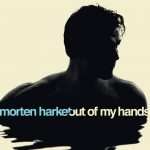
““There are parts on this album that I feel are shamelessly commercial, and that’s fun…I try to give people something they didn’t know they wanted. For me, that’s where pop music starts to get interesting.” – Morten Harket
Although a-ha had officially split up in December 2010, they briefly reunited for a performance of ‘Stay On These Roads’ at a charity concert at the Oslo Spektrum in August 2011, in aid of those affected by the terrorist atrocities the previous month. By this time the band’s three members had moved on with the other projects: Paul Waaktaar-Savoy formed Weathervane with Jimmy Gnecco, while Magne Furuholmen worked on new music with his supergroup Apparatjik, in addition to his art projects. Harket himself had begun work on his next solo album, the follow-up to 2008’s Letter From Egypt, in April. “The end of a-ha is not sad at all,” Harket told Norway’s TV 2 channel. “It’s great to have the time to do something different.” One such project was Lille Speil På Veggen Der, a Norwegian language version of Mirror, Mirror (a family fantasy movie based on the story of Snow White), which both Harket and his daughter Tomine (an experienced voice-over actress) lent their voices to. The film premiered in Norway in March 2012.
Harket’s manager Harald Wiik was equally optimistic about his client’s future: “Morten can have a monster hit in Germany next year,” he said in 2010. “Paul or Magne can’t…Who can go on tour with a-ha songs after a-ha? Not Paul, not Magne. But Morten can.” Whilst Harket certainly had the greatest chance of succeeding as a solo artist, he probably wouldn’t have anticipated the critical mauling he was going to receive from the Norwegian music press in respect of his fifth solo album Out Of My Hands…
In the final stages of the second phase of their career, a-ha had not only consolidated their return to the synth-pop of their early days with cover versions of ‘A Question Of Lust’ (Depeche Mode) and ‘Say Hello, Wave Goodbye’ (Soft Cell), 2009’s Foot Of The Mountain also saw them return to the 10-track template that they’d employed on their first three albums. It was a sound and format that suited the band, and – to the surprise of many people – Harket utilised this setup for his next solo album; not only retaining the services of part of the team that had made Foot Of The Mountain, including drummer Karl Oluf Wennerberg and producers Steve Osborne and Erik Ljunggren, but also including an exclusive Pet Shop Boys track that had been written especially for the project.
On two of the new album’s tracks, Harket teamed up with the band Kent (popular in both Norway and their homeland of Sweden, the act released their twelfth and final album in 2016). “The collaboration with Jocke and Martin was very interesting on many levels, and I really like Kent,” he told the newspaper Dagbladet. “They are straight to the point – no bullshit – and they’re a friendly and seasoned bunch of guys.” The threesome co-wrote ‘Lightning’, while Harket came up with ‘Burn Money Burn’, an English-language version of Kent’s 2002 hit ‘Kärleken Väntar’. “‘Burn Money Burn’ is unavoidably a political song,” Harket explained. “It’s first and foremost about values, but there’s also a direct criticism of the money system we live by, which I quite frankly feel is extremely dangerous, because there are only certain values in life that can be measured in money.” The track originally featured on Kent’s fifth best-selling (and award-winning) album Vapen & Ammunition. “He loved those songs and wanted to test out English versions,” Joakim Berg told Kent’s official website. It was reported that Harket had also attempted a new version of the same album’s Swedish chart topper, ‘Dom Andra’, but this was apparently abandoned due to time constraints.
One of the album’s most memorable tracks was ‘Scared Of Heights’, which was selected for single release in both the UK and Germany. The original track by Espen Lind, with was largely built around an effective ukulele strum, topped the charts in Norway in 2008, and formed part of Lind’s fifth album Army Of One (with drummer Per Lindvall guesting on a few of the tracks). According to Harket, it was Magne Furuholmen who had encouraged him to cover Norwegian hits: “Magne came up with the idea that I should pick out good Norwegian songs and take them abroad,” he told VG. “I liked that thought, and it’s something that I will pursue on my next solo albums as well. Not just to be kind, but because these songs will be relevant and more than good enough in markets where they haven’t been released before.”
Aside from his collaborations with Kent, there was another Swedish connection, too, with the new album marking Harket’s first songwriting collaborations with prolific songwriter, musician and producer Peter Kvint (aside from working with the likes of Natasha Bedingfield and Britney Spears, he had also produced Andreas Johnson’s ubiquitous worldwide hit ‘Glorious’ ). Whilst Harket was keen to introduce some new blood, there were some familiar names in the credits as well: David Sneddon, a Fame Academy winner who had previously worked with Hurts on their debut album Happiness, had a hand in the writing of ‘Keep The Sun Away’, while steadfast collaborator Ole Sverre Olsen was credited with co-writing four tracks, including future single ‘I’m The One’. “The song is about finding out who you are and that it’s okay to make mistakes in life,” Harket told German magazine Jolie. “A human is a complex being and has to make compromises when interacting with other people. But only if you are honest with yourself and take conscious decisions.”
Håvard Rem was involved by default, contributing ‘When I Reached The Moon’ (which dated back to the Wild Seed era). Harket had maintained contact with Rem, and made a surprise appearance at a book launch for Rem’s latest poetry collection 30-40-50 in February 2012. One other track (‘Undecided’), which appeared on the digital version of the album, was co-written by Hågen Rørmark, who’d played harmonica on the excellent Savoy song ‘Is My Confidence Reeling?’ (featured on their self-titled 2004 album).
A promotional single, ‘Lightning’, was released to Norwegian radio in February 2012, but reviews were mixed. Aftenposten certainly weren’t impressed: “With a title like this, one might expect some rumble and noise, but there is a surprising lack of energy here.” The review was indicative of the reception the album was about to receive from the Norwegian media, with Dagbladet’s assessment the most damning: “Unfortunately, Out Of My Hands turns out to be a lazy and unsubstantial addition to Harket’s five-album solo discography… Catchy at times, but unimaginative, and strikingly predictable.”
Following a huge amount of promotion, particularly in Germany and the UK, Out Of My Hands was released in the Spring of 2012. For the front cover of the album, Harket was photographed by Nevada-born Just Loomis, who had published a book of his a-ha photographs (with a foreword by Magne Furuholmen) the previous year. “He photographed us with a-ha for the first cover we did – Hunting High And Low – so there’s a lot of history there,” Harket told German talk show host Stefan Raab. “I met up with him in Los Angeles last year and we went for a shoot. And we ended up in the water – well, I did anyway!”
Despite the largely negative reception, the album provided Harket with another chart topper in his homeland, and it even crept into the Top 40 of the UK charts. Reviews were generally more favourable in the UK, with the BBC even declaring Harket a ‘maestro of melancholy’. However, Harket was unable to avoid the same criticisms that he’d received in Norway. MusicOMH magazine described the album as ‘limp and formulaic’, while The Scotsman was far more scathing: “Out Of My Hands is a strictly lightweight exercise in throwaway pop chirpiness, outdated synth arrangements, processed rock guitar and banal lyrics.” Whilst some of the criticisms were justified, it’s a surprisingly cohesive work (particularly when considering the number of songwriters, musicians and producers that were involved in its making), and a perfectly serviceable synth-pop album that makes full use of Harket’s impressive vocal range. Whilst ‘Scared Of Heights’ and ‘Burn Money Burn’ were both standout cuts, there was plenty to enjoy elsewhere. ‘Listening’, featuring the Pet Shop Boys’ trademark symphonic chords and a typically deft lyric from Neil Tennant (“I know your tastes in food and wine/ But never really what’s on your mind”) was another clear highlight. ‘I’m The One’ could have fitted in seamlessly on Foot Of The Mountain (even if its chorus is a little pedestrian); ‘Keep The Sun Away’, the album’s most electronic track, includes a playful Daft Punk-like twist with its robotic vocals, and there are some wonderful Ultravox-like flourishes on the excellent title track.
Following on from a European tour in April and May, Harket did some live shows in both Oslo and South America (where he’d remained popular since his time in a-ha). The same month saw Harket pick up a Green Music Award for his ‘long-standing commitment to electromobility, renewable energies and the protection of rainforest’. But there was a far more prestigious honour to come in November when Harket received a knighthood from the King of Norway, Harald V. At a special ceremony at Gamle Logen in Oslo, the three members of a-ha were each awarded ‘The Order of St. Olav’, a ‘reward for distinguished services rendered to Norway and mankind’, and a recognition of the band’s outstanding musical contribution.
Harket’s knighthood had rounded off a successful year in which he’d re-established himself as a solo artist. However, when it came to promoting the final single (‘I’m The One’) to be lifted from his latest album, Harket was seemingly keen to move swiftly on to his next project. “At the moment, my heart is not in it,” he told the German magazine Focus. “Out Of My Hands is like an old wife – I don’t want to meet her, because I’m in love with what’s happening now. This is my dilemma.” Harket had already started work on his next album…
Brother (2014 Album)
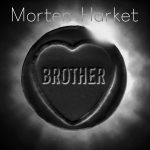
“The process of recording this album is the best I’ve ever experienced…When the material really hits you, when the songs have a distinctive character, that’s when I’m reminded why I got into music in the first place.” – Morten Harket
By the end of 2012, Harket had begun working with Swedish songwriter and producer Peter Kvint on the follow-up to Out Of My Hands. “We have built up this trust between us and have a really good collaboration going,” Kvint told Musikkpraksis magazine. “There are creative sparks flying constantly and we always end up with something when we sit down to write.” The recording sessions would see the singer abandon the synth-pop sounds of the previous album, employing a more stripped-back approach. “I didn’t like the a-ha machinery on Out Of My Hands,” he said in an interview with VG. “The a-ha back story was still present in my system, but I was impatient and didn’t want to wait before starting again. This is a much more peaceful project, without all that noise. Don’t get me wrong, I’m very happy with Out Of My Hands and everything that happened afterwards, but now I don’t have those connections anymore. There’s an open sky before me and I feel completely free – this definitely feels like a new start.”
Work on the new album at Kvint’s studio in Södermalm (Stockholm) followed successful songwriting sojourns to both Kristiansand in Norway and Ilha Grande (a beautiful island off the coast of Rio de Janeiro), with most songs credited to Harket, Kvint and Ole Sverre Olsen. Musicians included Swedish pianist Jesper Nordenström and Per Lindvall, who’d played on Wild Seed and several a-ha recordings.
There was one notable distraction, with Harket performing ‘Wind Of Change’ with The Scorpions in Athens during a series of acoustic shows in mid-September 2013. Harket’s version of the worldwide hit was included on the popular German band’s MTV Unplugged – Live In Athens album, released in November that year (the performance was also captured on a DVD and Blu-ray release).
By the end of the year Harket was ensconced in a 19-date tour of Germany, performing five tracks a night during the popular Night Of The Proms concerts. Harket debuted ‘There Is A Place’, which was released as a download single in November, and ‘Did I Leave You Behind?’ which was eventually left off the album. “We decided not to include it on the album because we felt that it stood out a bit from the rest of the material,” explained Kvint during a Facebook Q&A. “It sounded a bit different from the rest of the songs. However, it’s fully produced and mixed and will be released later in some form, probably as a single.”
‘There Is A Place’ was a beautiful piano-based ballad, and a clear indicator that Harket had reverted to the more organic soundscapes that had informed his earlier solo outings. “I can’t really say that we tried to simulate any previous record of Morten’s, or any other album,” claimed Kvint. “Somewhere halfway through the process I remember Morten saying that he had the same feeling about these songs that he had for the songs on Wild Seed. That album was also written in a rush of inspiration and quite quickly. Which was also the case with Brother.”
The first song that the pair composed for the new album was the extraordinary title track, which was released as a single in January 2014. “We were listening to Radiohead the day we wrote it,” recalled Kvint. “We were in a boathouse by the sea in Kristiansand, where we had two great writing sessions for the album… The theme of the song is two brothers who have chosen different paths and how to define the relationship between them. Morten wanted to write about Christianity and Islam and the tension between the two, but it’s also about humanity and how we can’t live without each other.” Impeccably produced, with an effective double-tracked vocal that showcased Harket’s baritone and falsetto, the song took its lyrical inspiration from Maajid Nawaz’s highly rated memoir Radical: My Journey out of Islamist Extremism. ” [It’s] about growing up as a young Muslim in England, faced with European, Western culture and politics,” Harket explained to VG. “And his personal confrontation with fundamental values after years of going down an uncompromising and dangerous road internationally as an Islamist.” The song’s memorable video, featuring Harket submerged in water, was directed by Harket’s friend, the filmmaker Harald Zwart, whose credits included the 2010 remake of The Karate Kid and a-ha’s controversial video for ‘Velvet’. “Harald Zwart got the idea for the music video immediately after hearing the song for the first time,” Harket said. “It’s based on a classic movie [Ägget är löst] by the Swedish comedians Hasse and Tage.”
Boasting a simple sleeve design, the Brother album was released in April. It provided Harket with his fourth chart topper in Norway, and it also enjoyed a 6-month residency in the album charts on the back of some largely positive reviews. “The title track’s longing melancholy, naked sensitivity and timeless reflection on the term identity sets the standard” wrote Aftenposten, while the newspaper Drammens Tidende praised it for its ‘elegant, well-crafted and catchy pop’. Dagbladet were less generous, though: “Brother starts well but fades gradually away in a stream of identical semi-ballads that do not take him to places he has not been before.” In the UK the album was Ken Bruce’s ‘Album of the Week’ on BBC Radio 2, and the reviews generally mirrored those in Norway. However, sales were disappointing and Brother peaked at a disappointing number 56. Whilst London magazine The Upcoming declared that the album was ‘fabulously produced’ and boasted ‘plenty of variety’, Classic Pop magazine were less enthused in their 2-star review: “Although Harket’s musings on identity, individuality and even death clearly mean much to him, this is an album that should have delivered much more to the listener.”
Brother is a fine addition to Harket’s catalogue of solo work, even if it rarely strays beyond Harket’s MOR comfort zone. The title track, in particular, ranks as one of his greatest songs. Elsewhere, ‘Heaven Cast’ recalled the melodic songwriting artistry of Neil Finn, ‘Whispering Heart’ boasted a soaring chorus that Paul Waaktaar-Savoy would have been proud of, and the meditative Ole Sverre Olsen-penned closer ‘First Man To The Grave’ was Nordic melancholia at its finest. Harket was certainly happy with the album, although he admitted that he wasn’t completely happy with the production of ‘Safe With Me’, a song that sonically stood out due to its programmed drums. “That’s a very primal song, basic and simple, but also very distinct. So we had to remove all the extra fluff and crap,” Harket confided to Musikkpraksis. “But that’s also one of the songs I like the most on the album. That one, ‘There Is A Place’ and ‘Brother’. Those songs have the clearest identities.”
A third single release, ‘Do You Remember Me?’ coincided with the start of a tour in support of the album, including several festival dates in the summer. In September Harket announced to Norwegian broadcaster Radio 102 that he’d begun working with Peter Kvint on new material, but plans for a new solo venture were about to be derailed…
Shadow endeavours (2014-2017)
“In the minds of the listeners, I’ll always be connected to the past. A-ha doesn’t go away, as it’s such a big part of me and my system.” – Morten Harket
During an a-ha fan club convention in October 2014, Harket concluded his Brother tour, while manager Harald Wiik also announced plans for a series of tantalizing a-ha reissues: “As of now there are plans for a 5-disc set of Hunting High And Low, with lots of new material,” he said. “Plus heavy vinyls of all the first five albums, a box set of the vinyls called The Warner Years… And then deluxe editions of Stay On These Roads, East Of The Sun and Memorial Beach. And some other things that I can’t tell you about now.” The ‘other things’ were the subject of much speculation over the coming weeks, before a-ha finally announced in December that they’d been invited to perform at the 30th anniversary of the Rock In Rio festival in September 2015, the scene of one of their greatest live performances. There was a further announcement at a press conference in March 2015 that the band would release a brand new album to coincide with the show. “It started off very easy and low-key with Morten dropping by my studio at various occasions,” explained Paul Waaktaar-Savoy. “I would show him songs that I was working on. He would sing on the songs he felt a connection with and leave the ones that didn’t and it just went like that until we had done ten or twelve songs.” For the first time since 2005’s Analogue, Harket was involved in the songwriting, contributing to three of Cast In Steel’s best songs: ‘The Wake’, ‘Forest Fire’ and the exceptional ‘Living At The End Of The World’.
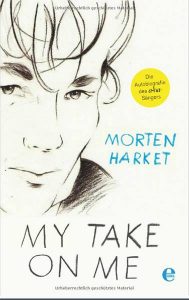
Harket also found the time to contribute a new version of ‘Hunting High And Low’ to a short film (Hemland) by Swedish filmmaker Sara Broos, which formed part of a documentary series titled Fans. Airing in Sweden in May 2015, Harket also appeared in the episode which revolved around a refugee named Raghad Kanawahti who cited the a-ha classic as the song that meant the most to her when growing up in war-torn Syria. “I had no idea there were people there who were listening to what we were doing, and that it mattered to them.” Harket said.
Harket also managed to pen an autobiography, appropriately titled My Take On Me. This was initially published in Germany in April 2016 and, at the time of writing, there has been no official word on English and Norwegian-language versions of the book.
The release of a Bendik Hofseth box set in 2016 saw Harket dabbling with experimental jazz. Along with the musicians Håkon Kornstad and Peder Kjellsby, Harket contributed a version of ‘The Boy From Port Manteau’ to the 25th anniversary version of Hofseth’s album IX.
At the Berlin press conference in 2015, Harket stated that a-ha’s reunion wasn’t permanent: “We’ve agreed to come back for a set period: one album, one tour,” he said. “It’s a great opportunity and allows us to write another chapter.” But the band have since added another chapter to their remarkable story, recently coming together for a brace of MTV Unplugged shows in June this year. Documents of these shows will be released via CD, DVD and Blu-ray in October, with acoustic and full-band shows to follow. And, with rumours of a new studio album mounting, there appears to be plenty of mileage left in this incredible band…
Many thanks to Suzie Dent, Celice Neo, Jan Omdahl, Sara Page, Jakob Sekse and Catherine Sexton.
a-ha.com
https://www.facebook.com/officialaha/
twitter.com/aha_com
www.mortenharket.com
www.facebook.com/mortenharket.official/
twitter.com/mortenharket
- QUEEN’S MACHINES – How Music Changes Through The Years (1979 – 1984) - July 25, 2021
- SUGAR RUSH – The Story of ‘Sugar Tax’ - May 7, 2021
- Survival – The Story Of ‘Machine and Soul’ - April 30, 2021





